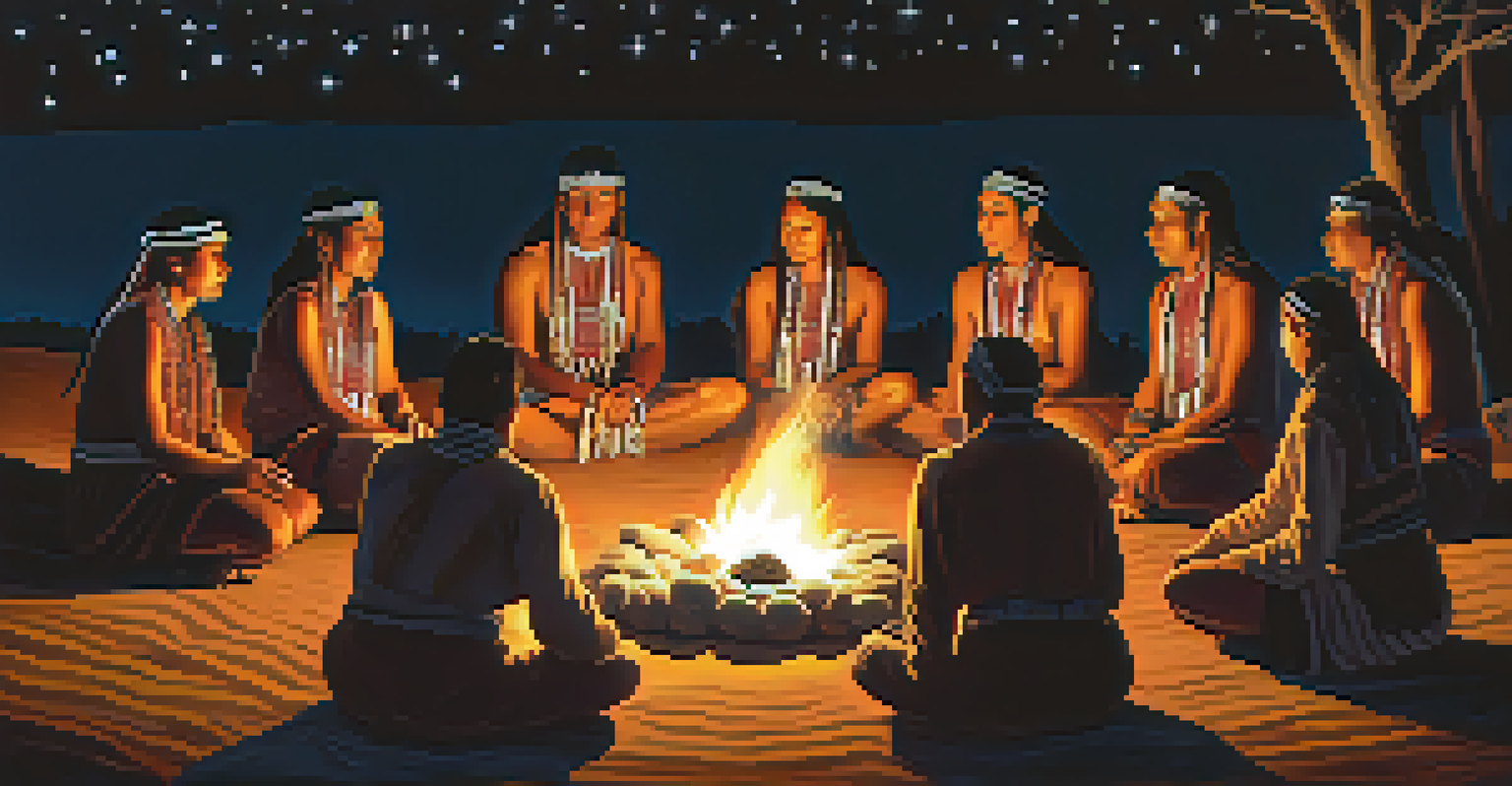Psychoactive Properties of Peyote and Dream States

Understanding Peyote: A Brief Overview
Peyote is a small cactus that has been used for centuries, primarily by Native American tribes, for its psychoactive properties. This unique plant contains mescaline, a powerful hallucinogen that alters perception and consciousness. When ingested, peyote can lead to vivid visual and auditory experiences, making it a significant element in various spiritual rituals.
The use of psychoactive substances can open pathways to understanding ourselves and the universe around us.
The use of peyote is deeply rooted in indigenous cultures, where it is often consumed during ceremonies to foster connection with the spiritual realm. It's not just about the experience itself; it’s about the cultural significance and the communal practices surrounding its use. This context is crucial for understanding how peyote affects both the individual and the community.
In recent years, there has been a growing interest in the therapeutic applications of peyote and its active compounds. Researchers are investigating its potential benefits for mental health conditions, including PTSD and depression. This renewed attention highlights the need for a nuanced understanding of peyote beyond its traditional uses.
The Role of Mescaline in Psychoactive Experiences
Mescaline is the primary psychoactive component found in peyote, and it plays a significant role in inducing altered states of consciousness. When consumed, mescaline interacts with serotonin receptors in the brain, leading to profound changes in perception, mood, and cognition. Users often report experiencing enhanced sensory perception, altered time perception, and deep emotional insights.

The effects of mescaline can vary greatly from person to person, influenced by factors such as dosage, individual mindset, and the setting in which it is consumed. This variability means that experiences can range from blissful and enlightening to challenging and introspective. Understanding these factors is essential for anyone considering the use of peyote for spiritual or therapeutic purposes.
Peyote's Cultural Significance
Peyote has long been revered by Native American tribes as a sacred tool for spiritual ceremonies and communal healing.
Interestingly, the insights gained during mescaline experiences often lead individuals to re-evaluate their lives and relationships. Many users describe feeling a sense of interconnectedness with nature and humanity, which can foster personal growth and healing. This transformative aspect of peyote can have lasting effects even after the experience has ended.
Dream States: What Are They and Why Do They Matter?
Dream states refer to the experiences we have while sleeping, often characterized by vivid imagery and complex narratives. These experiences can range from mundane to surreal, and they play a crucial role in processing emotions and memories. In many cultures, dreams are viewed as a window into the subconscious, offering insights into our innermost thoughts and feelings.
Psychedelics can provide insights into our personal challenges and inspire profound changes in our lives.
The connection between peyote and dream states is particularly fascinating. Many users report heightened dream activity and more vivid dreams after consuming peyote, suggesting that mescaline may influence the dreaming process. This can lead to a richer tapestry of dream experiences, allowing users to explore their unconscious mind in deeper ways.
Understanding how peyote affects dream states could have implications for both personal exploration and therapeutic practices. By enhancing dream experiences, peyote might serve as a tool for self-discovery, creativity, and emotional healing. This intersection of peyote use and dream states opens up exciting possibilities for individuals seeking to delve into their psyche.
The Science Behind Peyote and Its Effects
Scientific research on peyote and mescaline is still in its early stages, but what we do know is promising. Studies suggest that mescaline has the potential to promote neuroplasticity, which is the brain's ability to adapt and change. This could explain why users often report significant personal insights and emotional breakthroughs during and after their experiences with peyote.
Moreover, the effects of peyote are not just limited to the mind; they can also influence physical sensations and emotional states. Users often describe a feeling of euphoria, increased empathy, and even a sense of unity with their surroundings. This holistic approach to understanding peyote's effects highlights the interconnectedness of body and mind.
Mescaline's Therapeutic Potential
Research suggests mescaline, found in peyote, may help treat mental health issues like PTSD and depression through introspective experiences.
As researchers continue to explore the therapeutic potential of peyote, we may uncover even more about its benefits. The convergence of traditional knowledge and modern science could pave the way for new treatments and a deeper understanding of consciousness. This ongoing dialogue is essential for fostering respect and awareness around the use of peyote.
Cultural Significance of Peyote in Indigenous Practices
Peyote has been revered for thousands of years by various Native American tribes, serving as a sacred tool in their spiritual practices. During ceremonies, peyote is consumed to facilitate communication with the divine and to gain insight into personal and communal challenges. This cultural framework is crucial in understanding the respectful and intentional use of peyote.
The rituals surrounding peyote use are often communal, emphasizing connection, sharing, and collective healing. Participants engage in songs, prayers, and storytelling, which enhances the experience and fosters a sense of unity. This communal aspect of peyote ceremonies highlights the importance of context and intention in the use of psychoactive substances.
In today's world, preserving these cultural practices is vital, especially as interest in peyote grows outside of indigenous communities. Advocacy for the rights of Native American tribes to continue their traditional practices is essential, as is the need for education about the cultural significance of peyote. Respecting these traditions is paramount for anyone exploring peyote's psychoactive properties.
Potential Therapeutic Uses of Peyote
As interest in alternative therapies rises, peyote is being examined for its potential mental health benefits. Early studies suggest that mescaline may help with anxiety, depression, and PTSD by allowing users to confront and process difficult emotions. This has led to a renewed interest in how psychedelics like peyote can be integrated into therapeutic settings.
The therapeutic potential of peyote lies not just in its psychoactive effects, but also in the introspective journeys users undergo. These experiences can foster resilience, empathy, and personal growth, making it a valuable tool for those seeking healing. However, it’s essential to approach this area with caution and respect for its cultural roots.
Impact on Dream States
Peyote consumption may enhance dream experiences, allowing users to explore their subconscious more deeply.
While the therapeutic use of peyote shows promise, it should be undertaken with guidance from trained professionals. This ensures that individuals can navigate their experiences safely and derive maximum benefit. As research progresses, we may see more structured therapeutic models incorporating peyote and other psychedelics.
Conclusion: The Journey of Exploration
Exploring the psychoactive properties of peyote and its influence on dream states opens up a fascinating dialogue about consciousness, culture, and healing. By understanding the historical and cultural significance of peyote, we can appreciate its role in traditional practices while also considering its modern therapeutic applications. This intersection of old and new offers a rich tapestry of insights for those interested in mind-expanding experiences.
As we delve deeper into the science of peyote and its effects, the potential for personal and communal healing becomes clearer. The journey through altered states and dream experiences can lead to profound insights, allowing individuals to reconnect with themselves and their surroundings. Such exploration can foster a greater appreciation for the complexities of the human experience.

Ultimately, whether approached from a spiritual, cultural, or therapeutic perspective, peyote serves as a powerful reminder of the interconnectedness of our minds, bodies, and spirits. As we continue to learn and grow, the responsible and respectful engagement with peyote can enrich our understanding of ourselves and the world around us.